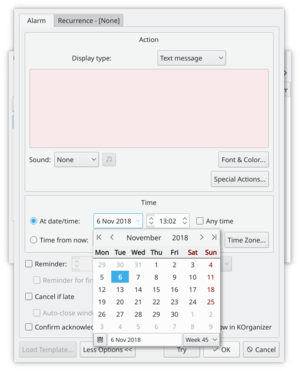KAlarm: Difference between revisions
mNo edit summary |
Wausaubill (talk | contribs) mNo edit summary |
||
| (9 intermediate revisions by 4 users not shown) | |||
| Line 1: | Line 1: | ||
<languages /> | |||
{| | |||
|[[Image:Kalarm.png|48px]]|| ||'''KAlarm is a personal alarm message, command and email scheduler''' | {|class="tablecenter vertical-centered" | ||
|[[Image:Kalarm.png|48px]]|| ||<translate><!--T:1--> | |||
'''KAlarm is a personal alarm message, audio, command and email scheduler'''</translate> | |||
|} | |} | ||
<translate> | |||
<!--T:2--> | |||
You can schedule alarm messages which pop up on the screen (with sound if desired), or you can schedule audio files to play, commands to be executed or emails to be sent. | |||
<!--T:3--> | |||
When configuring an alarm, you can: | |||
<!--T:4--> | |||
* For alarm messages, choose whether to type in your <menuchoice>own text message</menuchoice>, display the <menuchoice>text generated by a command</menuchoice>, or <menuchoice>display a text or image file</menuchoice>. | |||
* Configure the alarm to ''recur'' on <menuchoice>hours/minutes</menuchoice>, <menuchoice>daily</menuchoice>, <menuchoice>weekly</menuchoice>, <menuchoice>monthly</menuchoice> or <menuchoice>annual</menuchoice> basis, or set it to trigger <menuchoice>every time you log in</menuchoice>. You can also specify a repetition within a repetition. Alarms can be constrained to occur only <menuchoice>within working hours</menuchoice>, or <menuchoice>excluding holidays</menuchoice>. | |||
* Specify that a <menuchoice>reminder</menuchoice> should be displayed in advance of, or after, the main alarm time(s). | |||
* Choose a <menuchoice>color</menuchoice> and <menuchoice>font</menuchoice> for displaying the alarm message. | |||
* Specify an <menuchoice>audible beep</menuchoice> or a <menuchoice>sound file</menuchoice> to play when the message is displayed, or specify that the <menuchoice>message is to be spoken</menuchoice>. | |||
* Choose whether or not the alarm should be cancelled if it can't be triggered at its scheduled time. An alarm can only be triggered while you are logged in and running a graphical environment. If you choose not to <menuchoice>cancel the alarm if it can't be triggered at the correct time</menuchoice>, it will be triggered when you eventually log in. | |||
* and more ... | |||
<!--T:5--> | |||
[[Image:Kalarm2.png|300px|thumb|center|Setting an alarm]] | [[Image:Kalarm2.png|300px|thumb|center|Setting an alarm]] | ||
<!--T:6--> | |||
It is possible to use <menuchoice>multiple alarm calendars</menuchoice>, which for example enables you to share alarms between a laptop and desktop computer. | |||
<!--T:7--> | |||
Alarms may also be scheduled from the command line, or via D-Bus/DCOP calls from other programs. | Alarms may also be scheduled from the command line, or via D-Bus/DCOP calls from other programs. | ||
<!--T:8--> | |||
[[Image:Kalarm1.png|204px|center|thumb|The resulting pop-up]] | [[Image:Kalarm1.png|204px|center|thumb|The resulting pop-up]] | ||
== | == More Information == <!--T:9--> | ||
* [ | |||
<!--T:10--> | |||
* [https://apps.kde.org/kalarm/ Homepage] | |||
* [https://docs.kde.org/stable5/en/pim/kalarm/index.html KDE official documentation] | |||
<!--T:11--> | |||
[[Category:Office]] | |||
[[Category:Utilities]] | |||
</translate> | |||
Latest revision as of 13:46, 11 October 2021
| KAlarm is a personal alarm message, audio, command and email scheduler |
You can schedule alarm messages which pop up on the screen (with sound if desired), or you can schedule audio files to play, commands to be executed or emails to be sent.
When configuring an alarm, you can:
- For alarm messages, choose whether to type in your , display the , or .
- Configure the alarm to recur on , , , or basis, or set it to trigger . You can also specify a repetition within a repetition. Alarms can be constrained to occur only , or .
- Specify that a should be displayed in advance of, or after, the main alarm time(s).
- Choose a and for displaying the alarm message.
- Specify an or a to play when the message is displayed, or specify that the .
- Choose whether or not the alarm should be cancelled if it can't be triggered at its scheduled time. An alarm can only be triggered while you are logged in and running a graphical environment. If you choose not to , it will be triggered when you eventually log in.
- and more ...

It is possible to use , which for example enables you to share alarms between a laptop and desktop computer.
Alarms may also be scheduled from the command line, or via D-Bus/DCOP calls from other programs.

